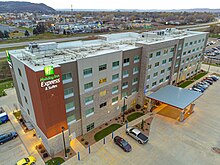Holiday Inn Express
 | |
| Company type | Subsidiary |
|---|---|
| Industry | Hotels |
| Founded | 1990 |
Number of locations | 2,826 (2019) |
Area served | Worldwide |
| Owner | IHG Hotels & Resorts |
| Parent | Holiday Inn |
| Website | www |
Holiday Inn Express is an American-based mid-priced hotel chain within the IHG Hotels & Resorts family of brands. Originally founded as an "express" hotel, their focus is on offering limited services at a reasonable price. Standard amenities lean toward the convenient and practical which cater to business travelers and short-term stays. As of September 2019, there are 2,826 Holiday Inn Express hotels featuring over 292,000 rooms worldwide.[1] The chain's concept was intended to target the "upper economy" market segment.[2][3][4][5]
In Europe, the hotels were known as Express by Holiday Inn,[6] but this variation was phased out during a rebranding which was announced in 2006.
History


Holiday Inn Express was founded in 1990 under the ownership of Bass.[7] Plans at the time called for 250 locations to be open by 1995.[8] The first three hotels under the Holiday Inn Express name all opened in 1990. These were located in Nashville, Tennessee; Abilene, Texas; and Poughkeepsie, New York. All three were converted from existing Holiday Inn properties.[9]
In 1996, the brand's first European location opened in Scotland.[8]
Starting in 1998, Holiday Inn Express started an ad campaign that featured ordinary people achieving superior feats, such as averting a nuclear disaster or performing like rock stars. When questioned on whether or not they are professionals, they would attribute their skills to their stay there with the reply: "No, but I did stay at a Holiday Inn Express last night!" The commercials originally ended with the tag line "It won't make you smarter. But you'll feel smarter." which was changed to "Stay smart, Stay at Holiday Inn Express." in 2000. The ads were created by Fallon Minneapolis, a unit of the French Publicis Group.[7] These ads have received positive reviews, and have been so successful they have crossed over into popular culture, having been featured in late night comedian jokes and political cartoons.[10] The ad campaign continued to air until 2009. It was revived in 2014 with new ads featuring comedian Jim Gaffigan.[11] In 2015, ads featuring comedian Rob Riggle were produced.[12]
Properties
Typical Holiday Inn Express hotels are built from corporate architectural prototypes, and tend to consist of 60–80 rooms, with a mix of suites and standard rooms in North American properties. Because the chain has been undergoing tremendous growth, the majority of Holiday Inn Express hotels are brand new or newly renovated.[13][14][15]
The original Holiday Inn Express properties were no-frills hotels with rooms comparable in quality to those of an upscale hotel, but there would be no room service, swimming pool, restaurant, bar, health club, meeting facilities or other on-site amenities, offering only continental breakfast and an exercise room. Newer Holiday Inn Express locations feature most amenities from the higher-end Holiday Inn brand, such as a restaurant and bar, conference rooms, and even a full fitness center with a swimming pool. A major differentiation is location, with Express properties typically found in suburbs and along freeways, while the upmarket Holiday Inns have been placed in urban areas (including downtown) and often near tourist attractions. Some Holiday Inn Express properties, such as Holiday Inn Express Banjara Hills, Hyderabad, India, offer 24-hour room service as well.[citation needed]
References
- ^ "Holiday Inn Express". development.ihg.com. Retrieved 10 November 2019.
- ^ "Our History". InterContinental Hotels Group. 8 June 2010. Retrieved 10 February 2011.
- ^ Wade, Betsy (16 December 1990). "On the Road, Sleeping for Less". The New York Times.
- ^ "You get what you pay for in economy motels". The News and Courier/Evening Post, Charleston, SC. 11 November 1990.
- ^ "Holiday Inn enters new market area". Daily News, Bowling Green, Kentucky. 8 October 1990.
- ^ "InterContinental's UK arm boosted by business travel upturn". Scotsman. Johnston Publishing Ltd. 27 May 2005. Retrieved 14 December 2011.
- ^ a b StreetJournal, Motoko RichStaff Reporter of The Wall (24 July 2000). "Holiday Inn Express Aims to Hone Image With Nontraditional New Ad Campaign". Wall Street Journal. Retrieved 1 May 2021.
- ^ a b "Holiday Inn Express factsheet" (PDF). InterContinental. Retrieved 8 May 2015.
- ^ "Holiday Inn unveils plans to strengthen lodging chain". The Commercial Appeal. 5 October 1990. pp. B3. Retrieved 14 January 2023.
- ^ Howard, Theresa (16 July 2001). "Slogan's buzz fuels hotel's biz". USA Today. Retrieved 13 June 2012.
- ^ Levere, Jane L. (3 September 2014). "Holiday Inn Express Tries Funny to Sell Free Breakfast". The New York Times. Retrieved 1 May 2021.
- ^ "Holiday Inn Express® Brand Hires Actor/Comedian Rob Riggle as Creative Director and Breakfast Excellence Honcho". InterContinental Hotels Group PLC. Retrieved 1 May 2021.
- ^ "Hotel owner adds 2 properties from defunct chain". The Daytona Beach News-Journal. 10 August 2010. Archived from the original on 25 January 2011. Retrieved 11 February 2011.
- ^ "New owner seeks to return hotel to prominence". The Daytona Beach News-Journal. 24 January 2011. Archived from the original on 21 February 2011. Retrieved 11 February 2011.
- ^ "Holiday Inn tweaks its brand to lure guests". Orlando Sentinel. 26 September 2010.
External links
![]() Media related to Holiday Inn Express at Wikimedia Commons
Media related to Holiday Inn Express at Wikimedia Commons
